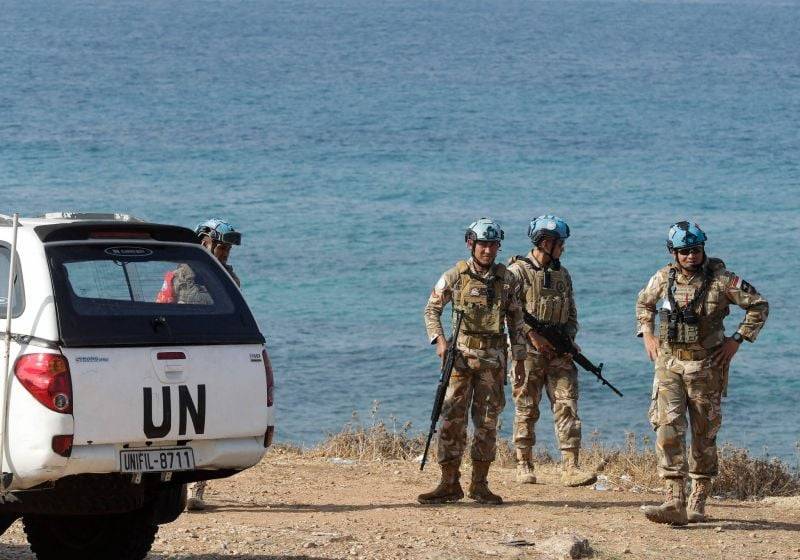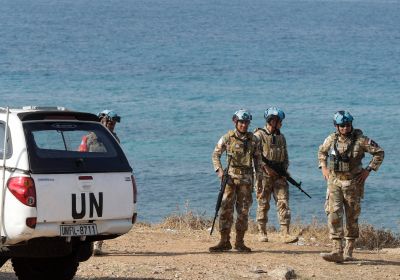
Soldiers from the United Nations Interim Force in Lebanon on patrol in Naqoura. (Credit: Mahmoud Zayyat/AFP)
The maritime border demarcation agreement will be signed this week. On Thursday, all eyes will focus on the border town of Naqoura where the “historic agreement between two enemy countries” — as it was described on Sunday by the US mediator arbitrating the maritime border negotiations between Lebanon and Israel, Amos Hochstein — will be signed.
The Israeli authorities could send the director general of the Energy Ministry to sign the document, as a sign pointing to the importance of the event for Israel — especially for its prime minister who seeks to promote the deal as a victory ahead of the general elections.
However, on the Lebanese side, the delegation that is supposed to go to South Lebanon tomorrow had as of Tuesday night not yet been formed. This is because while President Michel Aoun wants to celebrate what he deems an achievement during his term, Hezbollah prefers that the authorities keep a low profile.
Two separate rooms
According to information obtained by L’Orient-Le Jour, Hochstein is set to go to the Baabda Palace on Thursday morning to have Aoun sign the first annex of the final version. This document will also be signed by the US mediator.
In parallel, a similar procedure will take place on the Israeli side.
Later in the day, the second annex will be signed by both sides at the headquarters of the United Nations Interim Force in Lebanon (UNIFIL) in Naqoura. The delegations representing each of the two countries will be seated in separate rooms and each will sign the annex, before handing it over to the US envoy, who will transfer it to the UN.
It is a complicated protocol designed to ensure that the signing of the deal, which was negotiated over several years, would not be seen as a step paving the way for peace between the two neighboring countries.
“The fact that Lebanon and Israel will not sign a joint document clearly shows that this agreement is not a form of normalization,” said Faisal Abdel Sater, an observer close to Hezbollah.
It is from this same perspective that the Lebanese delegation that will sign this second annex had as of Tuesday night not yet been formed, even though the big day is fast approaching.
Hezbollah prefers that a military officer signs the document, while Aoun prefers to send a civilian figure from the Energy and Water Ministry, a portfolio held by his camp for the past 15 years.
In order to reconcile the two points of view, Lebanon could send a technocratic figure from the Energy Ministry, although, according to sources close to the talks who spoke to L’Orient-Le Jour, several officials have so far refused to take on this role.
According to a source close to the file, another option would be to send an army general and an expert from the Energy Ministry to Naqoura. When it comes to the military figure, this would be Afif Ghaith, head of the Lebanese Navy hydrographic services. As for the civilian, it could be either Wissam Chbat, chairman of the board of directors of the Lebanese Petroleum Administration, or Najib Masihi, an expert in international law, who is close to the president.
Baabda Palace, which is responsible for the delegation’s formation, refused to comment when contacted by L’Orient-Le Jour.
Is the army in an awkward position?
Yet, the presence of an army general tasked with signing the document in Naqoura could make things difficult for the military institution, as was the case in 1969 when the Cairo agreement was signed between Lebanon and the Palestine Liberation Organization.
At that time, army chief Emile Boustani represented Beirut and signed the agreement. However, although the document was signed with the consent of the political sphere, Boustani was strongly criticized a few years later by the ruling elite, when war broke out between the PLO and Christian militias.
Today, army chief Gen. Joseph Aoun is perceived as a serious candidate for president. He might therefore prefer not to involve the military institution in a matter that could complicate his ambitions.
Joseph Aoun had repeatedly stressed that the role of the army in this matter ended in December 2020, when negotiations were suspended due to disagreements between the two countries. Back then, the Lebanese Army was holding on to an additional 1,430 square kilometers of offshore territory, in addition to the disputed area, i.e to Line 29, which it deemed part of Lebanon’s rights.
It was based on this imperative that the amendment to Presidential Decree no 6433 was drafted, to rectify the map Lebanon transmitted to the UN in 2011. Yet, this decree had stalled on Aoun’s desk.
Apart from the delegation’s composition, Hezbollah also wants to ensure that the signing takes place away from the spotlight. So far, the press has not been called to cover the event in Naqoura. Hezbollah therefore wants to ensure that it will not be possible to compare this event with the Abrahamic Accords that normalized relations between Israel and several Arab countries and were celebrated in 2020 with great fanfare.
Aware of the fact that this deal is the key achievement of his term in office, since it would make it possible for the crisis-hit Lebanon to exploit hydrocarbons in its exclusive economic zone, Aoun would have preferred to celebrate the event, according to information obtained by L’Orient-Le Jour.
According to a source close to Ain al-Tineh, Aoun was planning to invite Parliament Speaker Nabih Berri and caretaker Prime Minister Najib Mikati to a ceremony on Thursday in Baabda.
Berri pulled the rug out from under the president, because, on the one hand, he does not want his biggest rival to use this agreement to his advantage, particularly since the speaker sponsored the framework agreement that put the file on track. On the other hand, he is joining the position of his ally Hezbollah, which would rather Lebanon keeps a low profile in relation to celebrating the agreement.
In contrast, the agreement will be much more publicized on the southern side of the border. “On Thursday, we will sign the historic agreement with Lebanon. Israel will become in the near future an important supplier of gas to Europe,” Israeli Prime Minister Yair Lapid said Monday.
According to Israeli media, a major media event is planned in Israel to celebrate the signing of the agreement.
This article was originally published in French in L'Orient-Le Jour. Translations by Joelle El Khoury.
